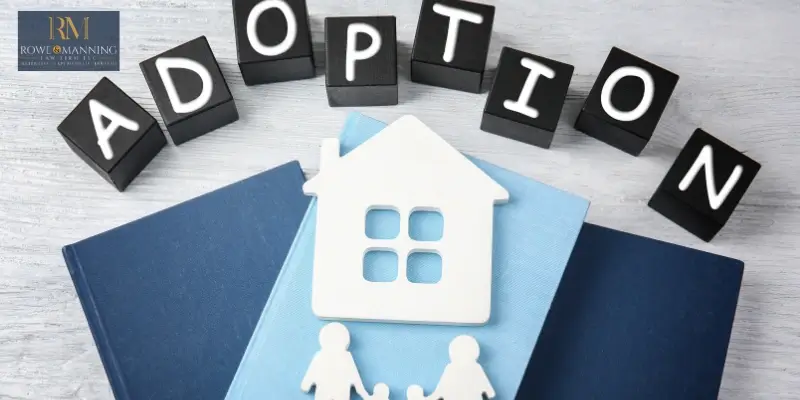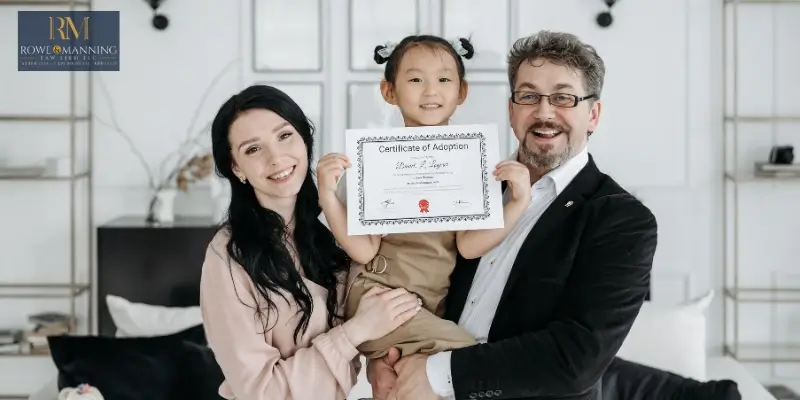Baton Rouge Adoption Attorney
Helping You Expand Your Family
Adding a new member to your family should be a joyous occasion. The legal aspect of traditional adoptions and intrafamily adoptions (i.e., stepparent adoptions, grandparent adoptions) can complicate the situation. To preserve your enjoyment of adoption, you need the assistance of a dedicated and knowledgeable family law attorney. A Baton Rouge adoption lawyer is here to proudly assist you with your adoption case.
Our compassionate family law team at Baton Rouge is here to proudly assist you with your adoption case, ensuring every legal requirement is handled with care and expertise. Whether you’re pursuing a stepparent adoption or other family adoption process, we’ll guide you through each step with personalized attention.

Trust An Attorney Who Knows The System
At the Rowe & Manning Law Firm LLC, we strive to efficiently and effectively resolve all of the legal issues that arise in conjunction with the adoption process. Our attorney William C. Rowe has extensive experience and a special interest in this area of law – he adopted his daughter as a newborn. Mr. Rowe is able to provide clients with a comprehensive view of the process, from both legal and parental perspectives, which helps facilitate clients’ comfort with the adoption procedures. Contact our Baton Rouge adoption lawyer to schedule an initial consultation to learn how we can help you.
Adoptions Take Many Forms
Intrafamily adoption is common. In this type of adoption, one parent remarries. In undertaking stepparent adoptions, we either get the consent of the biological parents or terminate parental rights, which is a difficult process. We also handle many grandparent adoptions for which the consent of the parents is needed.
The biological father whose paternity can be established through DNA testing must consent to an adoption.
The Adoption Process in Louisiana
The process of adoption includes several steps to protect the child and keep them safe. Prospective parents first contact an adoption agency or an attorney if they already have a child in their lives that they would like to adopt. Adoption agencies and attorneys are central in the adoption process and can offer guidance to make sure parents understand their responsibilities.
Once the process begins, a social worker visits the adoptive home to evaluate safety, stability, and the family’s readiness to adopt a child. The home study includes background checks and personal interviews to review their emotional preparedness. Completing the home study often takes several weeks depending on the family’s and agency’s schedule.
After passing the home study, the adoptive parents enter the matching phase if they go through an agency. The staff within the agency work to match the family with a child who needs a home. Once the family is matched, they may spend time getting to know the child to make sure it’s an appropriate match. During the final court hearing, a judge issues an adoption decree, giving the adoptive parents the full rights and responsibilities of parenting the child.
Types of Adoption
In Louisiana, there are three main types of adoption. Each has its own steps and legal considerations.
- Private Adoption: These types of adoptions occur directly between birth parents and adoptive parents, often with the help of an attorney. These adoptions allow for both parties to set their terms, which could include limited contact after adoption. Some private adoptions are closed, and there is no contact after the adoption.
- Public Adoption: State agencies facilitate public adoptions and normally include children in the foster care system. Many of these children are older or have unique needs. In Louisiana, public adoption can come with financial assistance, like subsidies, to help cover medical or educational costs.
- Foster Care Adoption: In some cases, parents first foster the child, with the possibility of adopting the child later. Foster parents have to meet state requirements, including training and ongoing evaluations to make sure the child is kept safe. If a child becomes eligible for adoption, the foster family often has the first chance to adopt them.
Each type of adoption has different benefits and challenges. Private adoption can offer more flexibility, especially if the birth parents and adoptive parents already know each other. On the other hand, public adoption can often provide families with financial support.
Rights of Birth Parents
Birth parents in Louisiana have certain rights during the adoption process. They can consent to or deny an adoption until the process is finalized. This allows them to make a fully informed decision. In some cases, birth parents and adoptive parents might agree on open adoption but these contracts are not enforced by law.
Birth parents also have the right to privacy. Adoption agencies protect the birth parents’ identities unless both parties agree to exchange information. If birth parents need extra support during the adoption, they could have access to counseling or financial support depending on the agency they go through. These services ensure that the birth parents have the resources to make a choice that they are comfortable with.
Costs of Adoption
Adoption costs in Louisiana vary by the type of adoption that takes place. Private adoption costs can include agency and legal fees, medical expenses for the birth mother, and home study fees. Private adoptions can become expensive depending on the services provided and the details of the arrangement.
In public adoption, the state covers many of the expenses associated with the process, especially for children in foster care or with unique medical or emotional needs. The state can also offer subsidies to adoptive families that can help them cover medical costs, counseling, and continuing education. These can help families meet their child’s needs and reduce the financial strain of a public adoption.
Families can also face additional costs post-adoption, such as legal fees for finalizing the arrangement. It could also cost money to file with the court and amend any birth records if necessary. With proper planning, adoptive families can prepare for the costs of adoption while focusing on creating a stable home.

FAQs About Adoption Law in Baton Rouge,LA
What Is the Adoption Process in Louisiana?
The adoption process in Louisiana follows a clear path. First, adoptive parents work with an agency or attorney to understand the requirements. Next, a home study takes place, where a social worker evaluates the home environment to make sure it meets safety standards. After passing this phase, adoptive parents are matched with a child. Finally, a court hearing finalizes the adoption and grants full legal custody to the adoptive parents.
Who Qualifies to Adopt in Louisiana?
To adopt in Louisiana, prospective parents have to meet specific requirements. They must be of legal age and able to show financial and emotional stability. Both single and married people can adopt, but unmarried people may face additional requirements. Prospective parents must also complete background checks and a home study to make sure they live in a safe and stable environment for the child.
Are Birth Parents Allowed to Change Their Decision After Adoption?
Birth parents may be allowed to change their decision after adoption for a limited time. They usually have a few days after signing the adoption papers to revoke their decision. After that window, consent becomes final unless there are cases of fraud or force involved. This policy protects the child’s interests by giving adoptive families stability. Birth parents should carefully consider the choice of adoption and speak with a counselor if necessary.
What Rights Do Birth Parents Maintain After Adoption?
The rights that birth parents maintain after adoption depend on the type of adoption. Typically, birth parents lose parental rights once the adoption is final. If the adoption is open, adoptive and birth parents may agree on limited contact from the birth parents; however, adoptive parents always make the final decision regarding contact. While birth parents lose the power to make decisions for the child, it is still possible to stay connected in certain situations.
Call Us For Help Navigating An Adoption
Adoption can be an important step in building a new family, and understanding the relevant laws that address this process can help make the journey smoother. At the Rowe & Manning Law Firm LLC, we will guide you through the process and ensure that your adoption is legally secure. Contact our Louisiana stepparent adoption attorney today. to learn more about how we can assist with your adoption needs.

